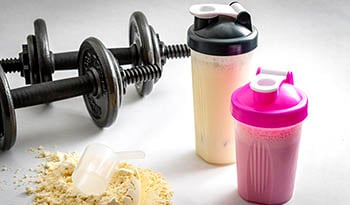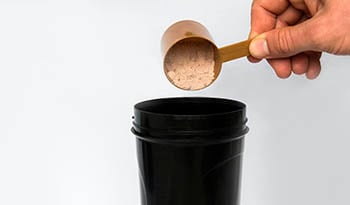Proteinski prašci: prednosti, najbolje vrste, + doziranje
Proteinski prah je najbrže rastuća kategorija dodataka prehrani, vođena rastućom sviješću o zdravstvenim prednostima proteina.1 Proteinski prah se obično koristi u smoothiejima i funkcionalnim pićima za podršku zdravstvenim ciljevima.
Što je protein?
Protein je, nakon vode, najzastupljenija tvar u ljudskom tijelu. Čini strukturni temelj za mišiće, kožu, kosu, nokte i vezivno tkivo i služi kao osnova za enzime i hormone. Adekvatni protein podržava rast mišića, regulaciju šećera u krvi i imunološku funkciju.
Zdravstvene prednosti proteinskih praha
Najvažniji razlog zašto bi netko svoju prehranu nadopunio proteinskim prahom je osigurati adekvatan unos proteina, posebno kada su sami izvori prehrane nedovoljni da zadovolje njihove individualne potrebe, kao što se događa kod vegana ili vegetarijanaca, starijih odraslih osoba i ljudi s povećanim potrebama za proteinima, poput oporavka, rasta, trudnoće ili bolesti
Korištenje proteinskih praha nudi prikladan, koncentriran i često kompletan izvor visokokvalitetnih proteina za povećanje unosa proteina. Što se tiče zdravstvenih prednosti, dodatak proteinskim prahom može pomoći u podržavanju sljedećih pet glavnih zdravstvenih ciljeva.
1. Rast i održavanje mišića
- Podržava sintezu mišićnih proteina, posebno u kombinaciji s treningom otpora.
- Pomaže u očuvanju mršave mišićne mase tijekom mršavljenja ili starenja (važno za sprečavanje sarkopenije).
2. Zdravo starenje
- Podržava zdravlje kože, zglobova i kostiju, posebno kada se koriste proteinski prah na bazi kolagena ili kazeina.
3. Oporavak nakon vježbanja
- Ubrzava popravak mišića i smanjuje bol nakon vježbanja.
- Pruža brzi izvor aminokiselina za podršku oporavku mišića.
4. Upravljanje težinom
- Potiče sitost (osjećaj sitosti), što može pomoći u smanjenju ukupnog unosa kalorija.
- Pomaže u održavanju brzine metabolizma očuvanjem mišićne mase tijekom dijeta.
5. Šećer u krvi i metabolička podrška
- Određeni proteini (npr. Sirutka, kolagen) mogu pomoći u poboljšanju osjetljivosti na inzulin i kontroli glukoze nakon obroka.
- GLP-1 stimulacija specifičnim proteinskim prahom može pomoći u regulaciji apetita i glikemijskoj ravnoteži.
Vrste proteinskih praha
Da bismo dalje opisali zdravstvene prednosti, pogledajmo najpopularnije dodatke proteinskim prahom.
Protein sirutke u prahu
Protein sirutke je najčešće korišteni proteinski prah i prirodni je nusproizvod proizvodnje sira. Kravlje mlijeko sadrži oko 6,25% proteina, 80% kazeina i 20% sirutke. Tijekom izrade sira, kazein tvori skutu dok sirutka ostaje u tekućini. Protein sirutke proizvodi se uklanjanjem laktoze, masti i minerala iz ove tekućine.
Sirutka je kompletan protein, bogat svim esencijalnim i neesencijalnim aminokiselinama. Posebno je cijenjen zbog visokih koncentracija glutamina i aminokiselina razgranatog lanca (BCAA), koje podržavaju stanično zdravlje, rast mišića i sintezu proteina.
Postoje dva primarna oblika:
- Koncentrat proteina sirutke (WPC): Sadrži 25— 89% proteina i širok raspon peptida.
- Izolat proteina sirutke (WPI): Filtriran da sadrži najmanje 90% proteina.
Iako popularan među sportašima i bodybuilderima, protein sirutke nudi prednosti za gotovo sve:
- Najveća biološka vrijednost bilo kojeg proteina
- Bogat glutaminom i BCAA za popravak mišića i energiju
- Lako se probavlja i učinkovito apsorbira
- Povećava mišićnu masu i snagu u kombinaciji s treningom otpora3
- Potiče sitost i podržava regulaciju šećera u krvi4
- Stimulira hormone koji reguliraju apetit poput GLP-15
- Pomaže u upravljanju težinom4
U nekim zemljama protein sirutke je prepoznat kao funkcionalna hrana za očuvanje mišićne mase (sarkopenija), stabilizaciju šećera u krvi i potporu kardiovaskularnom zdravlju.6
Protein sirutke također je prikladna, visokokvalitetna baza za hranjive smoothieje.
Kazein i drugi mliječni proteini
Kazein čini 80% proteina u kravljem mlijeku i, poput sirutke, cjelovit je, visokokvalitetni protein. Iako je manje popularan od sirutke zbog svoje teksture i nešto većih troškova, kazein podržava oporavak mišića na sličan način7. Polako se probavlja, što ga čini idealnim za trajni popravak mišića.
Izolat mliječnih proteina, koji sadrži i kazein i sirutku, napravljen je od svježeg mlijeka pomoću filtracije na niskoj temperaturi radi očuvanja strukture proteina. Može biti bez laktoze ili sadržavati laktozu i dobro se miješa u smoothiejima i drugim primjenama.
Bjelančevine jaja
Bjelančevina u prahu (albumin) napravljen je od sušenih bjelanjaka i kompletan je protein. Digestira se umjerenom brzinom, sporije od sirutke, ali brže od kazeina, nudeći trajne koristi. Potpuno je bez laktoze, što ga čini idealnim za one s alergijama na mliječne proizvode.
Protein kolagena i koštane juhe
Peptidi kolagena i proteinski prašci koštane juhe su među najbrže rastućim proteinskim dodacima. Protein koštane juhe dobiva se od pirjanih i dehidriranih životinjskih (piletina, govedina ili riba) kostiju i bogat je kolagenom. Često se konzumira kao slana juha ili se koristi u smoothiejima.
Kolagenski peptidi, dobiveni iz životinjskih izvora, podržavaju prirodnu proizvodnju kolagena u tijelu i pogoduju zdravlju kože, kose, noktiju, zglobova, kostiju i crijeva. Kliničke studije pokazuju da dnevna suplementacija (2,5—10 g) može smanjiti bore, poboljšati elastičnost kože, ojačati nokte, smanjiti osipanje kose, poboljšati fleksibilnost zglobova, povećati gustoću kostiju i podržati integritet crijevne sluznice. Kolagen je ključni protein za vezivno tkivo, koji djeluje zajedno s hijaluronskom kiselinom za održavanje cjelokupnog zdravlja.
Peptidi kolagena također mogu pomoći u podršci metaboličkom zdravlju i regulaciji šećera u krvi. Novi kolageni peptid, Nextida® GC, razvijen je za koncentriranje frakcija koje stimuliraju lučenje peptida-1 sličnog glukagonu (GLP-1) - hormona koji crijevne L-stanice oslobađaju kao odgovor na hranu. GLP-1 poboljšava funkciju inzulina, poboljšava kontrolu šećera u krvi i potiče sitost.
Nextida® GC sadrži specifične frakcije kolagena peptida koje se vežu za L-stanice i potiču proizvodnju GLP-1. Taj je učinak dokazan in vitro i u pretkliničkim ispitivanjima. Kliničko ispitivanje na ljudima pokazalo je da doze Nextide® od 5 g i 10 g smanjuju razinu glukoze u krvi nakon obroka do 42%, vjerojatno zbog povećanog izlučivanja GLP-1. Ovi nalazi ukazuju na to da dodatak Nextida® prije obroka može podržati zdrav metabolizam glukoze.18
Proteinski prašci na biljnoj bazi
Tržište biljnih proteina proširilo se izvan soje i riže, izvornih veganskih alternativa, zbog povećane potražnje i pristupačnosti. Mnogi biljni proteini podržavaju oporavak mišića i opću dobrobit19,20 i često se miješaju kako bi se stvorio cjelovit profil aminokiselina.
Protein graška
Protein graška sada je najpopularniji veganski protein, koji često zamjenjuje soju. Gotovo je potpun (malo metionina) i klinički je pokazano da podržava zdravlje mišića, šećer u krvi, sitost, krvni tlak i upravljanje tjelesnom težinom.21 Često se kombinira s drugim biljnim proteinima za uravnotežen profil.
Izolat proteina soje
Izolat proteina soje sadrži oko 90% proteina i kompletan je protein. Pokazao je koristi za kolesterol, kardiovaskularno zdravlje, antioksidacijsku podršku i hormonsku ravnotežu - posebno u menopauzi.22-24. Prirodno sadrži izoflavone (fitoestrogene) koji podržavaju zdravlje kostiju, iako neki izolati proteina soje ne sadrže izoflavone.
Spirulina
Spirulina je plavo-zelena alga bogata hranjivim tvarima koja sadrži ~ 60% visokokvalitetnih proteina, esencijalnih masnih kiselina, vitamina, minerala i fitokemikalija. Nudi antioksidativne, imunološke, kardiovaskularne i mišićno-zaštitne učinke i može pomoći u smanjenju umora od vježbanja.25,26
Protein sjemenki bundeve
Protein sjemenki bundeve dobiva na popularnosti zbog svog čistog profila i ugodnog okusa. Sa ~ 60% proteina, djeluje kao protein cjelovite hrane bogat vlaknima, vitaminima, mineralima i antioksidansima. Iako relativno malo metionina, nadopunjuje druge veganske proteine poput lana, chia i suncokreta.
Protein smeđe riže
Protein smeđe riže hipoalergen je i koristi se u detoksikacijskoj i eliminacijskoj dijeti. Nepotpun je zbog niskog sadržaja lizina, pa se često uparuje s proteinima graška kako bi se stvorio cjelovit protein.
Ostali veganski proteini
Ostale opcije uključuju proteine iz chia, lana, konoplje i sjemenki sacha inchi - svaki s oko 60% proteina i orašastim okusom. Protein konoplje, kada se oljušti, daje "srca konoplje" blažeg okusa i do 75% proteina. Oni su obično niži u lizinu, ali još uvijek mogu zadovoljiti potrebe kada su dio raznolike prehrane.
Aminokiseline: Građevni blokovi proteina
Proteini su lanci aminokiselina. Tijelo može sintetizirati većinu aminokiselina, ali devet se smatra "esencijalnim" i mora doći iz prehrane. Kvaliteta proteina ovisi o količini i ravnoteži esencijalnih aminokiselina, zajedno s probavljivošću.
Esencijalne aminokiseline
- Triptofan
- Valine
- Treonin
- Izoleucin
- Leucin
- Lizin
- Fenilalanin
- Metionin
- Arginin*
- Histidin*
Neesencijalne aminokiseline
- Alanin
- Prolin
- Tirozin
- Cistein
- Serin
- Glutamin
- Glutaminska kiselina
- Glicin
- Asparagin
- Asparaginska kiselina
*Bitno tijekom rasta
Procjena kvalitete proteina
Kompletan protein sadrži sve esencijalne aminokiseline u dovoljnim količinama. Većina životinjskih proteina je potpuna, dok kolagen i koštana juha nisu posljedica nedostatka triptofana. Nepotpuni biljni proteini mogu formirati kompletne proteine kada se strateški kombiniraju, na primjer, žitarice s mahunarkama.
Kvaliteta proteina mjeri se ocjenom aminokiselina ispravljene probavljivosti proteina (PDCAAS), u rasponu od 0 (najniži) do 1 (najviši).
- Životinjski proteini (sirutka, mlijeko, jaje): Ocjena 1
- Vrhunski biljni proteini:
- Izolat proteina soje: 0,98
- Koncentrat proteina graška: 0,92
- Spirulina: 0.91
- Sjemenke bundeve: 0,90
- Riža, chia, lan, suncokret, konoplja: 0,6—0,7
- Proteini kolagena i koštane juhe postižu ocjenu 0 zbog nedostatka triptofana, ali kada su ti izvori proteina uključeni u tipičan unos proteina u prehrani, oni imaju prilagođenu PDCAAS vrijednost od 1.2
Za vegane kombiniranje različitih biljnih proteina (mahunarke, cjelovite žitarice, sjemenke, orašasti plodovi) osigurava unos esencijalnih aminokiselina. Veganski proteinski prašci također nude vlakna, vitamine, minerale i fitokemikalije.
Preporuke za doziranje proteina
RDA (preporučena dijetalna doza) za proteine je 0,8 g po kg tjelesne težine (~ 55 g za osobu od 150 lb).
Međutim, veći unos (1,2—2,2 g/kg) često je koristan za:
- Sportaši ili oni koji rade intenzivan trening
- Djeca, tinejdžeri, trudnice/dojilje
- Starije odrasle osobe
- Vegani, posebno aktivni pojedinci
Predloženi unos proteina u prahu:
- Opće zdravlje: 20 g dnevno
- Umjereni trening: 20-40 g dnevno
- Intenzivni trening/izgradnja mišića: 20-40 g dva puta dnevno, ciljajući ~ 1,5 g/kg ukupnog unosa
Najbolje vrijeme:
- Gubitak težine: Prije jela ili kao zamjena obroka
- Oporavak/rast mišića: Nakon treninga
Riječ opreza: Tijelo ne može pohraniti višak proteina. Prekomjerna konzumacija može opteretiti bubrege i jetru ili dovesti do gubitka kalcija iz kostiju. Držite se preporučenih količina kako biste izbjegli štetne učinke.
Kako nadopuniti proteinskim prahom
Najpopularnija upotreba proteinskih praha je u smoothiejima. To je jednostavan obrok, međuobrok ili samo prehrambeni poticaj. Jednostavno stavite sastojke u blender i ukapljite. Evo nekoliko općih smjernica.
Korak 1: Odaberite svoj proteinski prah
Ovisno o vašim potrebama i preferencijama okusa, odaberite proteinski prah i dodajte 20 do 30 grama.
Korak 2: Odaberite svoju osnovnu tekućinu:
Jedna porcija smoothieja od 16 unci obično 12 do 16 unci tekuće baze. Odaberite između:
- Mlijeko na biljnoj bazi kao što su bademovo, zobeno ili kokosovo mlijeko.
- Mlijeko ili kefir
- Filtrirana voda
- Sok od rajčice, celera ili mrkve za slane smoothieje
Korak 3: Odaberite svoje istaknute sastojke
Dodajte 1 do 2 šalice istaknutih sastojaka. Evo nekih od standardnih izbora:
- Svježe ili smrznute bobice
- Sjeckana jabuka,
- Sirovi komadići kokosa
- Komadići ananasa
- Mango koplja
- Sjeckani kelj ili špinat
- Slani izbori:
- Bela paprika (sirova crvena, zelena, žuta, narančasta)
- Cikla (sirova sjeckana)
- Celer (sirovo nasjeckan)
Korak 4: Prehrambena pojačanja i začini
Smoothieji su savršena prilika da dodate snažne fitokemikalije u vašu prehranu. Evo nekoliko prijedloga:
- Prahovi za superhranu: 1 žličica do 1 žlica acai, sirovi kakao, goji, camu camu ili maqui prah
- Zeleni prašci: 1 žličica do 1 žlica spiruline, klorele u prahu, pšenična trava, ječmena trava ili drugi zeleni prah,
- Začini: 1 žličica svježeg ili mljevenog korijena đumbira, kurkuma, curry u prahu ili cimet.
Reference:
- Istraživanje Grandview. Izvješće o analizi veličine tržišta, udjela i trendova proteinskih dodataka. ID izvješća: GVR-1-68038-694-3.
- Paul C, Leser S, Oesser S. Značajne količine funkcionalnih kolagenskih peptida mogu se uključiti u prehranu uz održavanje neophodne ravnoteže aminokiselina. Hranjive tvari. 2019 15. svibnja; 11 (5): 1079.
- Li M, Liu F. Učinak suplementacije proteina sirutke tijekom treninga otpornosti na tjelesnu masu i mišićnu snagu: metaanaliza. Funkcija za hranu. 2019. svibnja 22; 10 (5): 2766-2773.
- Giglio BM, Lobo PCB, Pimentel GD. Učinci suplementacije proteina sirutke na masnoću, tjelesnu težinu i glikemijske parametre: sinteza dokaza. Nutr Metab Cardiovasc prosinac 2023. Veljača; 33 (2): 258-274.
- Nouri M, Pourghassem Gargari B, Tajfar P, Tarighat-Esfanjani A. Sustavni pregled učinaka suplementacije proteina sirutke na kontrolu glikemije kod ljudi: mehanički uvid. Dijabetes Metab Syndr. 2022 srpanj; 16 (7): 102540.
- Lesgards JF. Prednosti proteina sirutke na parametre dijabetes melitusa tipa 2 i prevenciju kardiovaskularnih bolesti. Hranjive tvari. 2023. 6. ožujka; 15 (5): 1294.
- Huang LP, Condello G, Kuo CH. Učinci mliječnih proteina na povećanje mršave mase izazvane treningom rezistencije za starije odrasle osobe u dobi od ≥ 60 godina: sustavni pregled i meta-analiza. Hranjive tvari. 2021 17. kolovoza; 13 (8): 2815.
- Kim DU, Chung HC, Choi J, Sakai Y, Lee BY. Oralni unos kolagenskog peptida niske molekularne težine poboljšava hidrataciju, elastičnost i bore u ljudskoj koži: randomizirana, dvostruko slijepa, placebom kontrolirana studija. Hranjive tvari. 2018 26. lipnja; 10 (7): 826.
- Evans M, Lewis ED, Zakaria N, Pelipyagina T, Guthrie N. Randomizirana, trostruko slijepa, placebom kontrolirana, paralelna studija za procjenu učinkovitosti slatkovodnog morskog kolagena na bore i elastičnost kože. J Cosmet Dermatol. 2021. ožujka; 20 (3): 825-834.
- Pu SY, Huang YL, Pu CM, Kang YN, Hoang KD, Chen KH, Chen C. Učinci oralnog kolagena na kožu protiv starenja: sustavni pregled i meta-analiza. Hranjive tvari. 2023. 26. travnja; 15 (9) :2080
- Vleminckx S, Virgilio N, Asserin J i sur. Utjecaj suplementacije kolagenim peptidom na vidljive znakove zdravlja i starenja kože i noktiju u istočnoazijskoj populaciji: dvostruko slijepo, randomizirano, placebom kontrolirano ispitivanje. J Cosmet Dermatol. 2024. studenog; 23 (11): 3645-3653.
- Hexsel D, Zague V, Schunck M i sur. Oralna suplementacija specifičnim bioaktivnim peptidima kolagena poboljšava rast noktiju i smanjuje simptome lomljivih noktiju. J Cosmet Dermatol. 2017. prosinac; 16 (4): 520-526.
- Trehan A, Anand R, Chaudhary G, Garg H, Verma MK. Djelotvornost i sigurnost kolagena za sjaj kože na koži i matrici kose: placebom kontrolirano kliničko ispitivanje na zdravim ljudskim ispitanicima. Clin Cosmet Investig Dermatol. 2024; 17:581-591.
- Bongers CCWG, Ten Haaf DSM, Catoire M i sur. Učinkovitost suplementacije kolagena na rezultate boli kod zdravih osoba s samo-prijavljenim bolovima u koljenu: randomizirano kontrolirano ispitivanje. Appl Physiol Nutr Metab. 2020. srpnja; 45 (7): 793-800.
- Semental-Mendía M, Ortega-Mata D, Acosta-Olivo CA i sur. Učinak suplementacije kolagenom na osteoartritis koljena: ažurirani sustavni pregled i metaanaliza randomiziranih kontroliranih ispitivanja. Clin Exp Rheumatol. 2025. siječanj; 43 (1): 126-134.
- Martínez-Puig D, Costa-Larrión E, Rubio-Rodríguez N, Gálvez-Martín P. Dodatak kolagena za zdravlje zglobova: veza između sastava i znanstvenog znanja. Hranjive tvari. 2023. ožujka 8. ožujka; 15 (6): 1332.
- König D, Oesser S, Scharla S, Zdziblik D, Gollhofer A. Specifični kolagenski peptidi poboljšavaju mineralnu gustoću kostiju i markere kostiju kod žena u postmenopauzi - Randomizirana kontrolirana studija. Hranjive tvari. 2018 16. siječnja; 10 (1): 97.
- Grasset E, Briand F, Virgilio N i sur. Specifični kolagenski hidrolizat poboljšava postprandijalnu toleranciju glukoze kod normoglikemijskih i predijabetičkih miševa te u prvoj studiji dokaza koncepta kod zdravih, normoglikemijskih i predijabetičkih ljudi. Food Sci Nutr. 2024. 20. listopada; 12 (11): 9607-9620.
- Kerksick CM, Jagim A, Hagele A, Jäger R. Biljni proteini i vježbanje: Kakvu ulogu biljni proteini mogu imati u promicanju prilagodbi vježbanju? Hranjive tvari. 2021 7. lipnja; 13 (6): 1962.
- Ahnen RT, Jonnalagadda SS, Slavin JL. Uloga biljnih proteina u prehrani, wellnessu i zdravlju. Nutr Rev. 2019. 1. studenog; 77 (11): 735-747.
- Lonnie M, Laurie I, Myers M i sur. Istraživanje svojstava biljnih proteina koji promoviraju zdravlje kao funkcionalnog sastojka prehrambenog sektora: sustavni pregled ljudskih intervencijskih studija. Hranjive tvari. 2020 30. srpnja; 12 (8): 2291.
- Xiao CW. Učinci sojinog proteina i izoflavona na zdravlje kod ljudi. J Nutr. 2008. lipanj; 138 (6): 1244S-9S.
- Prokopidis K, Mazidi M, Sankaranarayanan R i sur. Učinci suplementacije sirutke i proteina soje na upalne citokine u starijih odraslih osoba: sustavni pregled i metaanaliza. Br J Nutr. 2023. 14. ožujka; 129 (5): 759-770.
- Moradi M, Daneshzad E, Azadbakht L. Učinci izoliranih sojinog proteina, izoliranih sojinih izoflavona i sojinog proteina koji sadrže izoflavone na lipide u serumu u žena u postmenopauzi: sustavni pregled i meta-analiza. Crit Rev Food Science Nutrition 2020; 60 (20): 3414-3428.
- Lafarga T, Fernández-Sevilla JM, González-López C, Acién-Fernández FG. Spirulina za prehrambenu i funkcionalnu prehrambenu industriju. Food Res Int. 2020. Studeni; 137:109356.
- Lu HK, Hsieh CC, Hsu JJ, Yang YK, Chou HN. Preventivni učinci Spirulina platensis na oštećenje skeletnih mišića pod oksidativnim stresom izazvanim vježbanjem. Eur J Appl Physiol. 2006 rujan; 98 (2): 220-6.
ODRICANJE OD ODGOVORNOSTI: Ovaj Wellness kutak nije namijenjen za pružanje dijagnoza...

















































































 Sadržaj
Sadržaj














